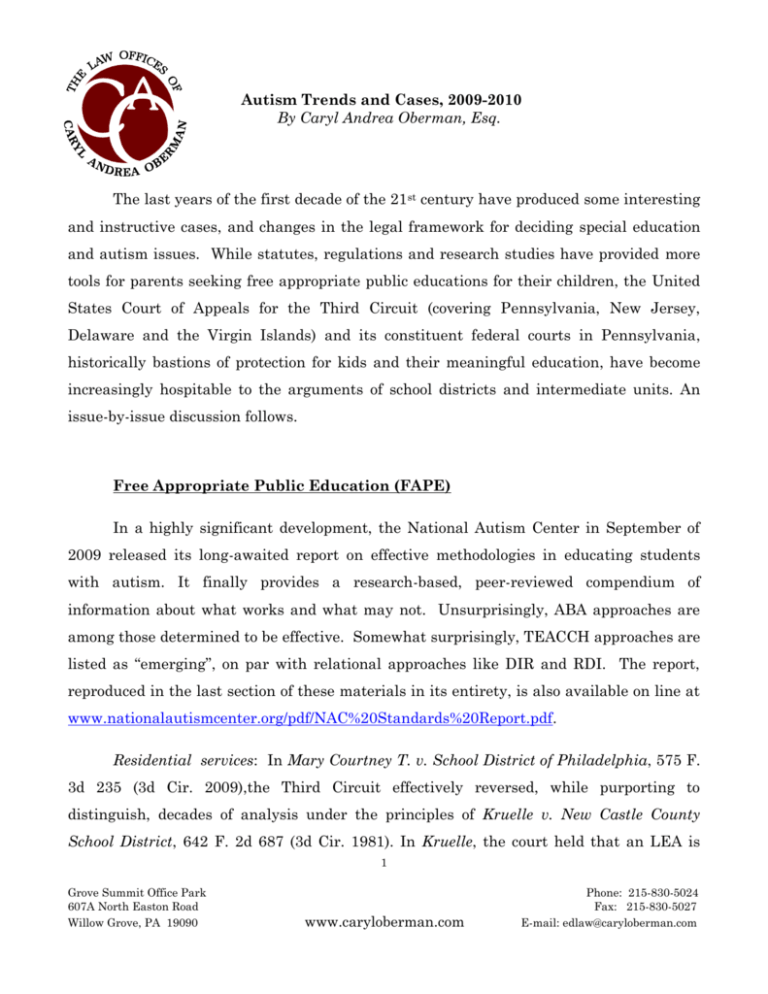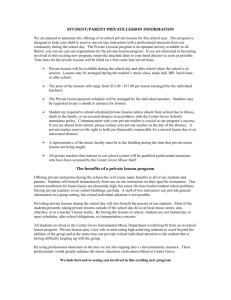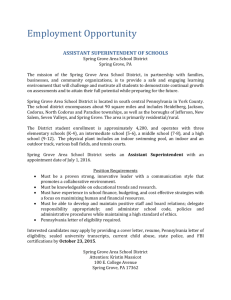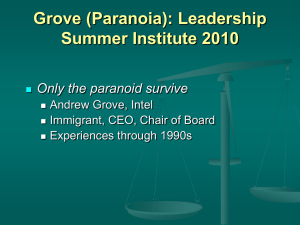Autism Trends and Cases 2010 - The Law Offices of Caryl Andrea
advertisement

Autism Trends and Cases, 2009-2010 By Caryl Andrea Oberman, Esq. The last years of the first decade of the 21st century have produced some interesting and instructive cases, and changes in the legal framework for deciding special education and autism issues. While statutes, regulations and research studies have provided more tools for parents seeking free appropriate public educations for their children, the United States Court of Appeals for the Third Circuit (covering Pennsylvania, New Jersey, Delaware and the Virgin Islands) and its constituent federal courts in Pennsylvania, historically bastions of protection for kids and their meaningful education, have become increasingly hospitable to the arguments of school districts and intermediate units. An issue-by-issue discussion follows. Free Appropriate Public Education (FAPE) In a highly significant development, the National Autism Center in September of 2009 released its long-awaited report on effective methodologies in educating students with autism. It finally provides a research-based, peer-reviewed compendium of information about what works and what may not. Unsurprisingly, ABA approaches are among those determined to be effective. Somewhat surprisingly, TEACCH approaches are listed as “emerging”, on par with relational approaches like DIR and RDI. The report, reproduced in the last section of these materials in its entirety, is also available on line at www.nationalautismcenter.org/pdf/NAC%20Standards%20Report.pdf. Residential services: In Mary Courtney T. v. School District of Philadelphia, 575 F. 3d 235 (3d Cir. 2009),the Third Circuit effectively reversed, while purporting to distinguish, decades of analysis under the principles of Kruelle v. New Castle County School District, 642 F. 2d 687 (3d Cir. 1981). In Kruelle, the court held that an LEA is 1 Grove Summit Office Park 607A North Easton Road Willow Grove, PA 19090 www.caryloberman.com Phone: 215-830-5024 Fax: 215-830-5027 E-mail: edlaw@caryloberman.com responsible for residential placement if the student’s need for such a placement is “inextricably entwined” with his or her educational needs. In Mary T., the court, in denying reimbursement, substituted a factual analysis that looked at cost, complexity and how close the services sought are to the typical mission of public schools and the expertise of public school teachers. Also troubling is the court’s apparent acceptance of the notion that medical conditions can render some children at least temporarily “uneducable”, a partial retrenchment on the bedrock principle that no child is uneducable and that all children are the responsibility of the educational system. In Richardson Independent School District v. Michael Z. and Carolyn Z., ____F. 3d___, 52 IDELR 277 (5th Cir 2009), the Fifth Circuit explicitly rejected the Kruelle entwinement standard and held that LEAs are only responsible for “essential” residential services. The court applied a two part test: that the residential services are essential for the child to receive meaningful educational benefit and that the residential services are primarily oriented toward enabling the child to obtain an education. See also School Board v. E.S., 561 F. Supp. 2d 1282, 49 IDELR 251 (M.D. Fla. 2008), upholding residential placement for a student with autism. Transition: In Fox Chapel Area School District, 53 IDELR 172 (SEA PA 2009), the student, a nonverbal young adult with autism, was entitled to a remedy because he had been given inadequate time to adjust to a transitional vocational program and placement. Service animals: In Kalbfleisch by Kalbfleisch v. Columbia Community School District #4, ____F. Supp. 2d______, No. 5-09-0447 (Ill. App. 12-16-2009), the court required the district to permit a child with autism to bring his service dog to school. See also: Travis G. v. New Hope-Solebury School District, 544 F. Supp. 2d 435, 49 IDELR 248 (E. D. Pa. 2008); J. N. v. Pittsburgh City School Dist., 536 F. Supp. 2d 564, 50 2 Grove Summit Office Park 607A North Easton Road Willow Grove, PA 19090 www.caryloberman.com Phone: 215-830-5024 Fax: 215-830-5027 E-mail: edlaw@caryloberman.com IDELR 74 (W. D. Pa. 2008),(a student’s injuries caused by his APS classmates did not render the APS inappropriate or deny him FAPE). Evaluations When must school districts allow private evaluators to observe the student in school, and to what extent? In School Board of Manatee County Florida v. L.H., ___ F. Supp. 2d___, 53 IDELR 149 (M.D. Fla. 2009), the court held that a district must allow a private psychologist to conduct in-school observations of an eleven year old student with Aspergers Syndrome and violated the IDEA by imposing unreasonable restrictions on that observation. The court held that the party paying for the evaluation made no difference. But see L.M. v. Capistrano Unified School District, 538 F. 3d 1261, 50 IDELR 181 (9th Cir. 2008), cert. denied, US 10/05/09 (No. 08-1414)(although limiting observations to twenty minute increments violated the state education code, there was no denial of FAPE where the evaluator was nevertheless able to form an opinion). 3 Grove Summit Office Park 607A North Easton Road Willow Grove, PA 19090 www.caryloberman.com Phone: 215-830-5024 Fax: 215-830-5027 E-mail: edlaw@caryloberman.com Behavior Interventions and Restraints Representative George Miller has introduced a bill in the U.S. House (“Preventing Harmful Restraint and Seclusion in Schools Act”, H.R. 4247) that would preclude IEP teams from authorizing the use of restraint or seclusion in schools. Such methods could, under the bill, still be part of school safety plans, provided that such plans were not specific to any individual student. A change to Pennsylvania’s special education regulations, 22 Pa. Code Section 14.133, requires the use of positive behavioral techniques, including functional behavioral assessments and behavior intervention plans. Procedure Statute of Limitations: Claims under Section 504 based on denials of FAPE are subject to the same two-year statute of limitations as the IDEA claims to which they are parallel. P. P. v. West Chester Area School District, ___F. 3rd___, No. 08-2874 and 08-2940, 53 IDELR 109, (3d Cir. 11-2-2009). Exhaustion of Administrative Remedies: A student with bipolar disorder who has graduated need not exhaust administrative remedies before pursuing claims of discrimination under Section 504 and the ADA because of a district’s failure to evaluate and provide services. Weidow v. Scranton School District., 53 IDELR 48 (M.D. Pa. 2009). Pleading: In C.N. v. Willmar Public Schools, ___F. 3d___, No. 08-3019 (8th Cir, 117-2010), the court dismissed constitutional claims and claims of abuse brought under Section 1983, in part because of allegedly inadequate pleading that did not meet the Twombly standard. 4 Grove Summit Office Park 607A North Easton Road Willow Grove, PA 19090 www.caryloberman.com Phone: 215-830-5024 Fax: 215-830-5027 E-mail: edlaw@caryloberman.com In Jonathan H. v. Souderton Area School District, 562 F. 3d 527 (3d Cir. 2009), the court held that a counterclaim in an IDEA action is not subject to the statutory ninety-day limitations period, but may be asserted under the usual time period for counterclaims. Records Access to information—The Family Education Rights and Privacy Act (FERPA) does not prohibit a parent asserting claim that an LEA predetermined services for a child (systematically denying all requests for 1:1 ABA services for children with autism) from obtaining discovery about the services provided to other students with autism. L.M.P v. School Board of Broward County Florida, 53 IDELR 49, (E.D. Fla. 2009). Remedies Tuition Reimbursement: In Forest Grove School District v. T. A., 129 S. Ct. 2484, 52 IDELR 151 (2009), the United States Supreme Court held that a child need not have actually received special education services from a school district in the past in order to be eligible for tuition reimbursement. In Forest Grove, the district had evaluated the student and erroneously found him to be ineligible for special education. The case is significant for the Court’s analysis of IDEA, similar to its analysis in Winkelman v. Parma City School District, 550 U.S. 516 (2007), that the statute is to be read as a whole and with an eye to its purpose, rather than closely parsed line by line. But see some troubling language in P.P. v. West Chester Area School District, ___F. 3rd___, No. 08-2874 and 08-2940, 53 IDELR 109, (3d Cir. 11-2-2009). 5 Grove Summit Office Park 607A North Easton Road Willow Grove, PA 19090 www.caryloberman.com Phone: 215-830-5024 Fax: 215-830-5027 E-mail: edlaw@caryloberman.com In Sytsema v. Academic School District No. 20, 538 F. 3d 1261, 50 IDELR 213 (10th Cir 2008), the court held that a district’s failure to provide a finalized IEP to a preschooler was a procedural error that did not result in substantive harm, and therefore yielded no tuition reimbursement. Compensatory Damages: In Chambers v. School District of Philadelphia, the Third Circuit held that compensatory damages are not available under IDEA. ___F. 3d___, No. 07-4790, 2009 WL 3948295, (3d Cir. 11-20-2009). As to their availability under Section 504 for claims parallel to denial of FAP/IDEA claims, compare Annika T. v. UnionvilleChadds Ford School District, ___F. Supp. 2d___, Civ. A. No. 08-4944, 2009 WL 778350 (E.D. Pa. March 24, 2009) (yes), with Neena S. v. School District of Philadelphia, ___F. Supp. 2d___, Civ. A. No. 05-5404, 2008 WL 5273546 (E.D. Pa. Dec. 19, 2008)(no). Expert witness fees: Although expert witness fees cannot be recovered by a prevailing party under IDEA, at least one court in the Circuit has held that they may be recoverable under Section 504 of the Rehabilitation Act of 1973 if the denial of a free appropriate public education constitutes disability discrimination. L.T. v. Mansfield Township School District, ___ F. Supp. 2d___, 53 IDELR 7, (D. NJ 2009). Prevailing party/ Legal fees: In Weissburg v. Lancaster School District, ___F. 3d___, No. 08-55660, 2010 WL 114960 (9th Cir. 1-14-2010), parents were the prevailing parties where a school district misclassified a student as having retardation and not autism, since a student with both disabilities would have been entitled to be taught by a teacher sufficiently skilled to teach students with both disabilities. The court awarded attorneys’ fees to the student’s attorney, who was also his grandmother. 6 Grove Summit Office Park 607A North Easton Road Willow Grove, PA 19090 www.caryloberman.com Phone: 215-830-5024 Fax: 215-830-5027 E-mail: edlaw@caryloberman.com Other Important Developments ADAA Amendments, effective 1/1/09. Parental Consent/revocation of consent to services, 34 CFR Sections 300.300(b)(4) and 300.9(c)(3) (effective 12/31/08). 7 Grove Summit Office Park 607A North Easton Road Willow Grove, PA 19090 www.caryloberman.com Phone: 215-830-5024 Fax: 215-830-5027 E-mail: edlaw@caryloberman.com








